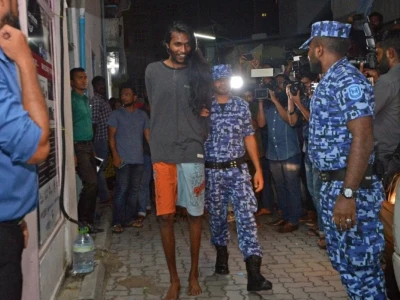
Police to publish new rules on witness protection in court
The need for a formalized witness protection system arose from gaps in the existing legal framework.
Top Stories
The Commissioner of Police, Ali Shujau, has announced that rules governing the protection and security of witnesses in court proceedings have been finalized and will be made public later this month. This long-awaited development comes after years of concern over the safety of witnesses, particularly in high-profile criminal cases in the Maldives.
The need for a formalized witness protection system arose from gaps in the existing legal framework. Under the Criminal Procedure Act of 2016, every investigative body was required to create regulations outlining procedures for handling complaints and investigations within three months of the Act coming into force. Although the police published their initial regulations in September of that year, these rules did not address the protection of witnesses a critical issue in many criminal cases.
This oversight led to an amendment in 2021, mandating the formulation of specific rules to ensure witness protection. The amendment was driven by the increasing need to safeguard witnesses, particularly in cases involving gang-related violence and organized crime. Despite the amendment, no formal rule had been finalized or made public until now.
The absence of clear regulations on witness protection recently led to a legal dilemma in the Criminal Court. During a hearing in a murder case, February 2023 killing of Mohamed Ahmed Didi (Nautte) inside the Krasa shop, the prosecution requested that the court issue a protection order for its witnesses. However, defense attorney Hamza Latheef challenged the request, arguing that there were no clear rules for the judge to follow in issuing such an order. He pointed out that the Criminal Procedure Code provides that witness protection requests should be evaluated based on a classification rule, which had not yet been formulated by the police.
This legal grey area raised questions about how courts should proceed in cases where witness protection is necessary. The uncertainty underscored the pressing need for formal regulations, particularly in cases involving the intimidation of key witnesses—an issue that has plagued major criminal cases in the country.
Despite the lack of formal regulations, Commissioner Shujau emphasized that the police are already providing protection services for witnesses through a Witness Protection Unit. While the official rules have not been gazetted, Shujau assured that witnesses requiring protection are receiving support. He further stated that the delay in finalizing the rules was due to several factors, including the need to ensure that the framework was feasible within the current resources of the police force.
"The rule on how to protect witnesses has been formulated but not yet made public. It will be gazetted this month at the latest," said Shujau.
The delay in making the rule public was attributed to the following reasons:
-
Implementing witness protection on a national scale requires significant resources and technical expertise, which the Maldives police are currently working to secure.
-
The police have been collaborating with foreign experts and the Prosecutor General’s office to ensure that the witness protection rules are comprehensive and effective.
-
The police are ensuring that the proposed measures align with their current capabilities and infrastructure before releasing the rules to the public.
The issue of witness intimidation remains a serious concern in the Maldives, particularly in cases involving organized crime and gang violence. In high-profile cases, such as the murder of Mohamed Anas, who was stabbed to death in Malé seven years ago,prosecutors have struggled to secure convictions due to the withdrawal of key witness testimonies, often the result of threats and intimidation.
In the Faihu Nizam case, which is tied to the murder of Mohamed Ahmed Didi, witness protection has again become a focal point, with defense counsel arguing that the lack of clear guidelines has made it difficult for courts to protect witnesses effectively. The case highlights the urgent need for formalized protections, as prosecutors often face difficulties in securing convictions when witnesses refuse to testify.




